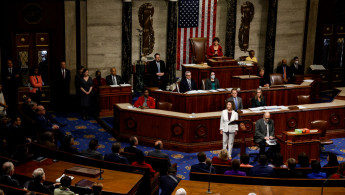How will the new US Congress makeup affect Middle East policy?
With the Republicans in the United States set to hold the majority in the House of Representatives for the next two years, there will unlikely be any major shifts in US policy in the Middle East given the two main parties' general unity on foreign policy, but there can be expected at least some attempts at more right-wing policy.
"What will be a big difference with Republicans controlling the House is that they will try to put through the most hawkish legislation," Beth Miller, government affairs manager at Jewish Voice for Peace-Action, told The New Arab.
She noted that even more conservative-leaning Democrats have had lines they wouldn't cross, such as disregarding internationally recognised borders and lessening free speech protection.
"There were things the Democrats refused to do when they were in power. They refused to criminalise BDS. But the Republicans have no qualms against going up against a civil liberties organisation," Miller said, referring to the series of state legislation passed over the past several years aimed at criminalising the Boycott Divestment Sanctions movement, which is set to be defended by the American Civil Liberties Union at the conservative-majority US Supreme Court.
Also in the category of free speech, she worries Congress could try to codify the International Holocaust Remembrance Alliance definition of anti-Semitism, which is being interpreted to mean that anti-Semitism includes criticism of Israel and Zionism. The definition is being taken up by local governments and institutions, and critics worry it could have far-reaching implications for free speech rights for those criticising Israeli policy.
The newly elected Republican-majority Congress comes at a time when Israel recently elected its right-wing government. Some of the first statements from the US Congress could be in response to Israel's new government, which could not only affect Palestinians' rights, but also the country's liberal democracy.
Depending on how extreme its policies, including toward the LGBTQ+ community, there's a chance it could lose support from mainstream Democrats in Congress who support it, in large part, for its potentially intolerant position on gay rights.
"How far can they go with the new right-wing Israeli government?" Adam Shapiro, director for advocacy for Israel-Palestine at Democracy in the Arab World Now (DAWN) told TNA. Israel's LGBTQ community is very fearful now that they have a right-wing government that's anti-LGBTQ rights."
He notes that some members of Congress, including Representative Ritchie Torres of New York, have cited Israel's pro-gay rights position as a major reason why they support the country.
"If that disappears, then it could become a question of which camp they support," said Shapiro.
"Would that mean people like that could be moved to a better position when it comes to the Palestinians? It will be an interesting dynamic."
For now, it appears that the status quo will largely remain in place, with the chance for more right-wing policies with the Republicans' narrow majority in Congress. This could also include closer ties to Saudi Arabia and more pressure to abandon talks with Iran on a renegotiated nuclear deal.
With Pelosi leaving her House leadership position, her presumptive replacement Hekeem Jeffries has long been seen as a friend to Israel.
The congressman, though progressive on some important issues such as voting rights, has previously stated that he supports legislation that would penalise US companies and individuals that support BDS.
Meanwhile, Kevin McCarthy, one of the top contenders for House Majority Speaker, has said he will remove Ilhan Omar from her committee leadership positions.
One change that could play out in the media could be a strengthening in the pushback against progressives, who are increasingly seen as a threat to the US government's unconditional support for Israel.
Senator Susan Collins of Maine, set to hold the Republican party's top position with the Senate Appropriations Committee, has already said she is committed to ensuring that the US does not set conditions for aid to Israel.
The incoming 118th Congress will see several new progressives joining the House, including Summer Lee from Pennsylvania, who faced a tough race in the face of millions of dollars in attack ads by an AIPAC super-PAC. However, with their minority status, at least for the next two years, most of their power will lie in their outspokenness.





 Follow the Middle East's top stories in English at The New Arab on Google News
Follow the Middle East's top stories in English at The New Arab on Google News


